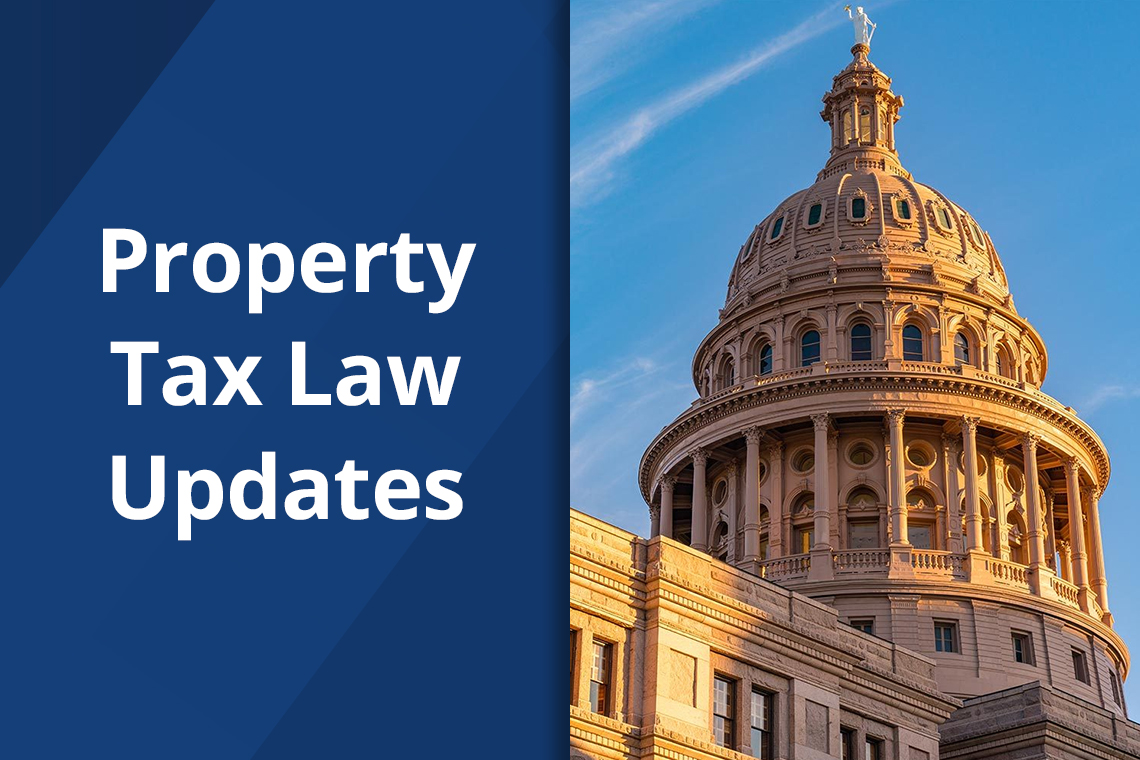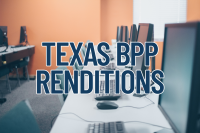12 Significant Updates to Texas Property Tax Law in 2023 You Need to Know

What you need to know about the most significant updates to Texas property tax law:
- The school district homestead exemption will be increased from $40,000 to $100,000.
- School property tax will be reduced by 10.7 cents through maintenance and operation (M&O) rate compression.
- A 20% appraisal cap pilot program will apply for certain non-homestead real property.
Senate Bill 2: Homestead Exemptions
Senate Bill 2 (SB2) raises the homestead exemption from $40,000 (approved in May 2022) to $100,000. This amounts to $681 in average savings on a homeowner’s school tax at the statewide ISD tax rate of $1.136 (Senate Research Center, Bill Analysis).
Homeowners aged 65 and older, or disabled, who did not receive full benefits from previous bills passed in May 2022 will be provided the full exemption increase with this bill. They will also automatically benefit from future increases passed by the Legislature without the need for a separate constitutional amendment. Local taxing units are prohibited from reducing or repealing an existing optional homestead exemption until after the 2027 tax year.
Effective Date: upon approval of HJR2 by voters on November 7, 2023
Senate Bill 2: School District Rates
SB2 also adds 10.7 cents of school district maintenance and operations (M&O) rate compression in the 2023 tax year and to each successive year’s rate calculation. This means that for every $100 of a property’s valuation, the M&O property tax rate would be reduced by 10.7 cents.
Effective Date: upon approval of HJR2 by voters on November 7, 2023
Senate Bill 2: Appraisal Caps
An appraisal cap pilot program will be implemented to limit the appraised value of non-homestead real property, valued at $5 million or less. Appraisal districts may not raise the taxable value of any applicable property by more than 20% from the previous year. The program would apply to commercial, mineral, and residential properties without a homestead exemption and will expire on December 31, 2026.
Effective Date: upon approval of HJR2 by voters on November 7, 2023
Senate Bill 2: New Elected Board Positions
SB2 provides counties with a population of 75,000 or more with three new elected positions for the appraisal district board of directors. Currently, boards typically have nine members in appointed positions. The change to add elected members will help hold the board more accountable to property owners. This board of directors will also determine the county’s appraisal review board membership.
Effective Date: upon approval of HJR2 by voters on November 7, 2023
House Joint Resolution 2: Constitutional Amendments
The House Joint Resolution 2 (HJR2) amends the constitution to authorize the Legislature to make the changes set out in SB2 related to property tax.
Effective Date: upon voter approval on November 7, 2023
House Bill 1228: Modernized Communications
House Bill 1228 (HB1228) expands a property owner’s, or their designated agent, access to information used for the property’s appraisal. They can now request communications electronically in addition to mail and will not be charged a fee for the information.
Effective Date: January 1, 2024
Senate Bill 2355: Binding Arbitration Applications
Senate Bill 2355 (SB2355) moves the filing of binding arbitration applications from the appraisal district to the Comptroller’s office. Property owners, or their agents, will be able to file electronically when the new online system is available. Deposit payments must be made online if the application is filed electronically, and cashier’s checks will no longer be accepted.
Effective Date: January 1, 2024
House Bill 2488: Burden of Proof in Property Tax Appeals
House Bill 2488 (HB2488) establishes the burden of proof for the appraisal review board in certain property tax appeals filed under Chapter 42. The board must establish the appraised value by “clear and convincing evidence” if the value of the property for the previous tax year was determined at a trial on the merits. This bill will apply only to appeals filed on or after the effective date.
Effective Date: September 1, 2023
House Bill 796: Creation of Appraisal Review Board Protest Hearing Database
House Bill 796 (HB796) requires the chief appraiser of each district to create a protest hearing information database that is publicly available online and updated no later than October 1 of each year. For each protest hearing, the database will contain the names of each appraisal review board member, the date and time of the hearing, the account number and category of the property, the appraised value according to the appraisal board and the property owner’s asserted value, and the board’s determination of the protest. The chief appraiser is required to include a link to the database on the county property tax website no later than the effective date of this bill.
Effective Date: January 1, 2024
House Bill 4101: Binding Arbitration to Compel Compliance
House Bill 4101 (HB4101) authorizes property owners who have filed an appraisal protest for their property to request binding arbitration to compel the appraisal review board or chief appraiser to comply with hearing procedures adopted by the board. This expansion of property owners’ authorization will create a more affordable and less burdensome process. This will only apply to requests related to a protest filed on or after the effective date of the bill.
Effective Date: January 1, 2024
House Bill 1285: Expansion of Taxpayer Liaison Officer Duties
House Bill 1285 (HB1285) expands the duties of taxpayer liaison officers in appraisal districts with a population of 120,000 or more. The liaison will be authorized to resolve property owner complaints against the appraisal district or appraisal review board regarding matters not related to the appraisal of property. The taxpayer liaison must also publicize the available positions on the appraisal review board. The chief appraiser is responsible for posting the duties and contact info of the taxpayer liaison online (if the district has a website) and in the required comptroller taxpayer assistance pamphlet.
HB1285 also authorizes the appointment of one or more deputy taxpayer liaisons. A training program for deputy taxpayer liaisons and taxpayer liaison officers must be established and supervised by the comptroller. Training must be completed within the first year of employment and every even-numbered year thereafter.
Effective Date: January 1, 2024
House Bill 2121: Notarization Requirements for Business Personal Property Renditions
House Bill 2121 (HB2121) eliminates the notarization requirement for rendition statements for business personal property when the value of the property is $150,000 or less. This bill will only apply to renditions for tax years beginning on or after the effective date.
Effective Date: January 1, 2024
For questions on how these Texas property tax law updates will impact you or how to reduce your residential or commercial property tax bill, contact Gill, Denson & Company Tax Advisors today.









